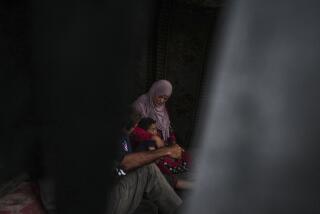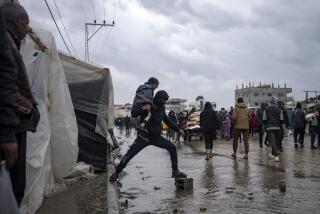Muslim Groups Take Lead in Cairo Quake Relief : Egypt: Mosques house and feed the homeless. Disappointment in government assistance is expressed.
CAIRO â At a small but growing tent city around the ancient Mosque of Ibn Talun, hundreds of Egyptians left homeless by this weekâs earthquake waited Wednesday for handouts of blankets, mattresses, food and cash. Their benefactors: serious-faced young men in beards bearing placards saying, âIslam Is the Solution.â
A few hours earlier, a government man had come by with a pickup truck full of promises. He pledged free apartments and cash handouts, then drove off in the dust.
âHow can we find you again?â a man whose house had collapsed in nearby Sayed al-Zaynab wanted to know. âA donkey knows the way,â the man replied before disappearing.
But here, in a makeshift relief center run by Islamic fundamentalists, help was at hand. âThe Muslim is a brother to the Muslim, like bricks in one building, holding each other,â proclaimed a sign at the entrance to the center, one of eight set up around the city by the Muslim Brotherhood and the fundamentalist-controlled Physiciansâ Syndicate.
As hundreds of families prepared to spend their third night on the streets in the wake of 4the devastating quake that killed more than 450 people and injured 4,000, both the government and the Islamic relief agencies scrambled to find housing for the homeless and reparations for the victims.
Officials began handing out keys to the first of 1,000 government-owned apartments to families left homeless by the disaster. President Hosni Mubarak, completing a tour of the worst- damaged sections of the city, said the government will offer $1,600 to every family left homeless or fatherless, $600 to the injured and $150 to families whose homes were damaged.
âEveryone who lost his house, whether owner or tenant, will get a house, and we will try our best to compensate them, because they are Egyptian citizens. We will not leave people living in the streets,â Mubarak said, adding, âThe situation could have been worse, but God has been merciful.â
Still, the initial waves of relief came not from the government but from the cityâs mosques, which housed and fed the homeless in the first hours after the disaster, and the physiciansâ humanitarian committee, the same fundamentalist group that has recently raised millions of dollars to aid Muslims in Bosnia-Herzegovina and Somalia.
âThe fact is that the peopleâs and the Muslimsâ move was faster than the governmentâs was, whether in assisting people or setting up tents to house them,â said Ahmed Banna, a spokesman for the fundamentalist Muslim Brotherhood.
âIf the government agencies had reacted faster, if there were no bureaucracy and a willingness to move, and no problem of the unavailability of the responsible person in their working areas, death and losses could have been lowered. . . . People are disappointed in the government. They moved very slowly, and they didnât move at all except when the Muslim movement initiated it.â
In the disasterâs wake, the Brotherhood immediately sent trucks into neighborhoods, calling on merchants for donations of food and money.
The Physiciansâ Syndicate set up clinics for the injured and toured the cityâs hospitals. It offered $15 to the injured and $60 to each homeless family. Relief centers set up near the sites where the government is providing new housing offered blankets, pots and pans and food for the new residents.
By midmorning Wednesday, the first of 580 families were loaded onto buses and driven out to a network of concrete high-rises in the new suburb of Salaam City, about an hour east of downtown, where the government is offering 1,000 flats temporarily to the homeless. Most of the new tenants, residents of ancient neighborhoods of narrow alleys and familiar markets and cafes, clutched new donated mattresses and stepped uncertainly from the buses, surveying the new high-rises suspiciously.
âThis is out in the ruins, out in the graveyard. But itâs better than nothing, I guess,â said Mervat Fayed Hafez, who was unsure how she would commute to her job in a medical laboratory in central Cairo.
But said Mahmoud Abdel Moneim, who has slept in the street with his wife and three children since his house in Bulaq collapsed during the quake: âPraise God, itâs good. As God wishes, we might be here forever.â
At least two more aftershocks up to a magnitude of 3.7 shook the region Wednesday, one just after dawn, the second shortly before noon. And at least two more houses and a huge wall collapsed Wednesday in Cairoâs older districts.
* RELATED STORY: B4
More to Read
Sign up for Essential California
The most important California stories and recommendations in your inbox every morning.
You may occasionally receive promotional content from the Los Angeles Times.










